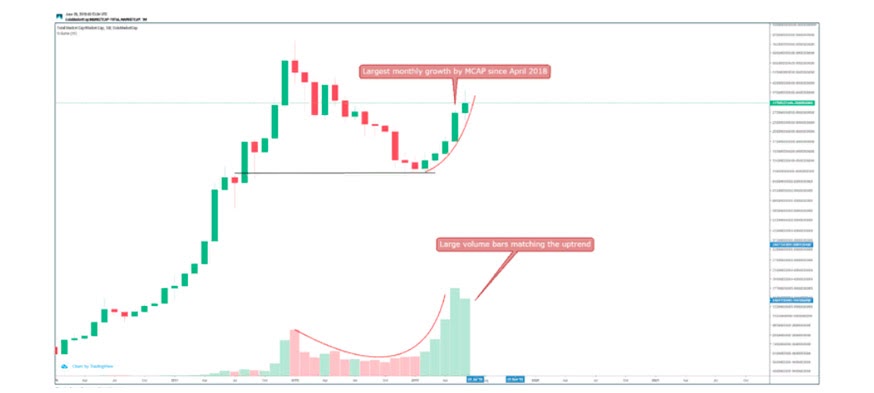Table of Contents
- The Role of the Broker
- Nature of the Crypto Beast
- Existing Trading Platforms
- Looking Toward the Future
The cryptocurrency market can be abstract, confusing, and foreign to the people who are unfamiliar with it, and to better understand the potential future of crypto we should take a look at the current markets and their protocols. Stocks, for example, involve buying and selling a share of a company in the hopes that you buy it low and sell it high (meaning you make money on it). The FOREX market is similar, but instead of trading stocks you are trading currencies, so you would want to buy a currency when it is low and sell it when it is high.
There are thousands of nuances in these markets, including different ways of trading, ways to manage accounts, and different restrictions around the world that must be taken into consideration when trading. And because of these nuances, people become confused, which is traditionally where brokers step in to help. Brokers have filled a void in traditional markets by helping traders understand and execute the trades they are making. Do they have a similar place in the world of crypto?

Source: dilbert.com
The Role of the Broker
Brokers exist in both the physical and digital world, and the introduction of online brokers created an entire subset of discount brokers that users can use at reduced fees (and often reduced services as well). According to Investopedia, there are a few key takeaways to understand about brokers:
- A broker is an individual or firm that charges a fee or commission for executing buy-and-sell orders submitted by an investor.
- Full-service brokers provide execution services as well as tailored investment advice and solutions, while discount brokers execute trades on behalf of a client. However, they typically don’t provide investment advice.
- Brokers register with FINRA (Financial Industry Regulatory Authority), while investment advisers register as RIAs (Registered Investment Advisor) through the SEC.
Brokers have definitely helped make traditional markets more accessible to both retail and institutional investors. Imagine a broker as a taxi cab driver in a busy metropolis you’ve never been to before. Sure, you could take the time to study a map, learn the rules of driving for that city, and rent a car to travel throughout the city yourself. Or you could pay a small fee to have someone already familiar with the city find the quickest and most efficient way for you to get to your destination. With this in mind, wouldn’t it be a good idea if we had a similar service for the cryptocurrency world?
Nature of the Crypto Beast
As mentioned earlier, cryptocurrency is similar to traditional markets, it’s only rebranded and reorganized. There are some key differences between the markets, of course, and these differences have definitely slowed the influx of brokers entering the crypto world. The nature of the crypto market itself makes introducing brokers tricky, here’s why:
- Decentralization
The entire market is built on the idea of decentralization, it is the founding principle of Bitcoin. Decentralized markets are harder to regulate and predict; since they aren’t owned by a central authority there is no one particular person or organization to “punish” when things go on an unforeseen path. Because of this, traditional brokers struggle to interact with crypto in a legal fashion since the law often lags behind innovation.
- Digitalization
There are no physical assets in crypto, everything is digital. Other markets have a base; stocks are connected to a “physical” company, FOREX trades currencies that are connected to a “physical” country, etc. But because crypto is purely digital, new assets can appear overnight, and assets that seemed to be secure can vanish just as fast. This unpredictability makes it hard for a broker to trade in more than just the “big” crypto markets.

Source: coindesk.com
Just as crypto is spurred into growth by distrust in centralized organizations, traditional brokers have, more often than not, failed to keep up with the ever-changing crypto market, and because of this they have opened the door for a different type of broker to enter the playing field.
In cryptocurrency, brokers are replaced by trading platforms, as a type of organization or company that is bound by no specific law or regulatory body. They differ from traditional brokers in that they are not trading for you, but instead give customers all the tools they need to place their own trades on the global cryptocurrency market. They work to exist in all regulation regions, adapting practices where necessary, and opting to be as accessible as possible by the largest number of users.
There are a few key points that a trading platform would need to touch on in order to be successful:
- The need to charge some sort of fee or commission on trades, transactions, withdraws, or deposits in order to stay in business.
- Offer either a full-service approach, where they guide users through crypto trades, or provide users with a full suite of information to allow the user to make the best possible trade based on all of the presented information.
- Be governed by some sort of regulating mechanism.
Existing Trading Platforms
Trading platforms come in many shapes and models, each targeting different niches to appeal to their various customer bases. Tokenplace is a trading platform that appeals to customers looking to easily manage funds across many different exchanges, Coinigy is a similar company that is geared toward US customers who already have accounts on many exchanges but want an easy way to compile the data, and Robinhood is trying to tap into the traditional market while slowly encouraging their users to trade in crypto. All of these companies are acting as a cryptocurrency broker in a sense, but Tokenplace is slowly pulling ahead of the others thanks to the creative innovations they have planned.
While Robinhood and Coinigy are definitely great options, they fall short when it comes to their ability to easily give customers the option to trade on different exchanges. For instance, Robinhood is a solid choice when you just want an easy way to trade crypto, but its lack of diverse price options, data presentation, and clear fees make it a mediocre choice. Coinigy stands up to Tokenplace in many categories, going toe to toe when it comes to usefulness, but they fall short in streamlining the overall user process.
Tokenplace, however, hits all the right notes you’d want in a trading platform, especially compared to traditional options. They address the need for decentralization by giving their users a way to easily check and compare prices on several exchanges, and their “Cross-Coin Architecture” strategy will ensure that their users can stay on top of market shifts. They are building an innovative way for their users to experience stable coin prices while still having the ability to trade in crypto, through their TOK coin, which will earn its holders money as the value of the company grows. Tokenplace has lofty goals for the future, including mobile apps and a trading program improvement specially designed to save their users money, and according to their current roadmap they have managed to hit every checkpoint so far. If they stay on their current path they will grow into an even more serious contender in the global broker market, so keep a close eye on them in the coming months.
Looking Toward the Future
Blockchain technology, and subsequently cryptocurrency, is growing larger with each passing day. Facebook is moving into the space with Libra, JP Morgan refuses to leave the space, and even an NFL team has started accepting it as a form of payment. Cryptocurrencies aren’t disappearing anytime soon, so it’s high time that the average user had a fair way to invest and manage their investments through a global trading platform.

Source: xkcd.com
As crypto becomes evermore integrated into our daily lives, services like Tokenplace and Coinigy will be crucial in managing an ever-growing portfolio across many different coins. And with any luck, as more markets become loosely connected with one another we’ll start seeing less and less volatility across the crypto market as a whole. Time tells all, of course, but one way or another, global trading platforms will become a crucial factor for the ultimate success of cryptocurrencies.
Investment Disclaimer








